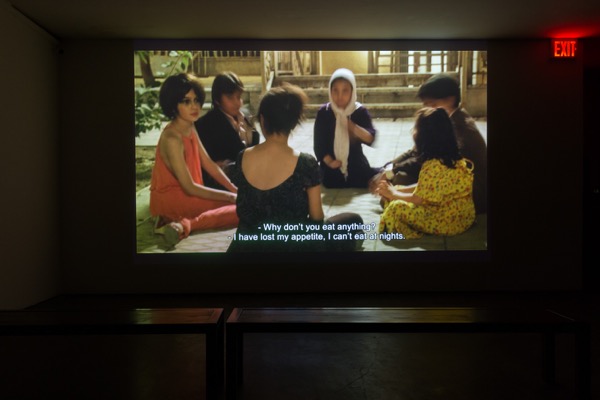
Jess T. Dugan, Anahita Ghazvinizadeh, Nicki Green, Rhys Ernst & Zackary Drucker, Young Joon Kwak, Carlos Motta, Cobi Moules, Chelsea Thompto, Gil Yefman, Rona Yefman
RECENT PRESS:
Hyperallergic
SCHEDULED EVENTS:
Gil Yefman performs Tumtum during the opening on Saturday, March 5, 7pm and also on April 7, from 7pm-7:30pm, in conjunction with DUMBO First Thursday Gallery Walk.
GENDER/POWER performance – led by Maya Ciarrocchi and Kris Grey and created in collaboration with Becca Blackwell, massima desire, Sara Jimenez and Pamela Sneed with choreography by Sandra Parker and dramaturgy by Clarinda Mac Low – Sunday, April 3, 2-3pm
Saturday, April 16, 6:30-7pm:
![]() (SIGNAL), curated by Alexis Heller, opens at Smack Mellon on March 5 and will be on view through April 17, 2016. This exhibition presents artworks that challenge the gender binary and explore a continuum of self-definition. Working in diverse mediums, these eleven contemporary artists utilize code, collaborative representation, fantasy and play to subvert histories that have denied gender variance. They question authorship over ‘the natural’, make manifest sites of resistance, and reimagine a future where identities are fluid, becoming ad infinitum and celebrated as such.
(SIGNAL), curated by Alexis Heller, opens at Smack Mellon on March 5 and will be on view through April 17, 2016. This exhibition presents artworks that challenge the gender binary and explore a continuum of self-definition. Working in diverse mediums, these eleven contemporary artists utilize code, collaborative representation, fantasy and play to subvert histories that have denied gender variance. They question authorship over ‘the natural’, make manifest sites of resistance, and reimagine a future where identities are fluid, becoming ad infinitum and celebrated as such.
![]() , written in a binary code created by Chelsea Thompto, translates into the word SIGNAL. The exhibition’s title begins communication around what happens when the gender binary becomes illegible. In the absence of fixed gender markers, where can we start to understand each other and how do we make ourselves known? The code, and works in dialogue as part of
, written in a binary code created by Chelsea Thompto, translates into the word SIGNAL. The exhibition’s title begins communication around what happens when the gender binary becomes illegible. In the absence of fixed gender markers, where can we start to understand each other and how do we make ourselves known? The code, and works in dialogue as part of ![]() , resists the ability to take a ‘quick read’ and requires a more complex process of discovery. By engaging history, acts of defiance, real experiences of violence, and imagination, a more nuanced language of gender possibility emerges.
, resists the ability to take a ‘quick read’ and requires a more complex process of discovery. By engaging history, acts of defiance, real experiences of violence, and imagination, a more nuanced language of gender possibility emerges.
Nicki Green, Cobi Moules and Gil Yefman renegotiate the past’s treatment of transgender bodies by mining cultural, artistic and religious traditions and symbols and recalibrating them to highlight empowered narratives. Nicki Green’s ceramic bricks and quilted hankies picture androgyny and transformation as divine, with imagery from Jewish mythology and queer code. Paintings from Cobi Moules’ series Bois Just Wanna Have Fun, portray self-portraits of the artist in multiples, playing in stunning wild landscapes. The works significantly integrate his trans body in the natural, a response to the ideologies of his conservative Christian upbringing and the Hudson River School. Gil Yefman also shifts cultural messages about androgyny, with his large knitted sculpture, sound piece and performance, Tumtum. Translated in Jewish law and modern Hebrew to mean ‘unclean’ or ‘stupid’, Yefman instead presents a corporeal being that is at once monstrous and magnetic.
Jess T. Dugan, Rona Yefman, Carlos Motta, and Chelsea Thompto explore active resistance to gender norms and moments of solidarity and brutality faced as a result. Jess T. Dugan’s intimate portraits redefining masculinity reflect on how connections with others help us author our own identity. In her multimedia project spanning 14 years, Rona Yefman documents her sibling Gil’s transition, from male to female and then beyond gender, and their fantastical relationship that helped bolster their survival. Carlos Motta’s video portraits of transgender and intersex activists expose the powerful organizing, advocacy, and education efforts of gender self-determining communities and the perilous conditions that make their work vital. Chelsea Thompto’s expansive piece, Trans Effigy 2015, comprises code written in charcoal on the wall, along with wooden sculptures. Given a key to decipher it’s meaning, viewers are engaged in a slow dialogue around deconstructing the gender binary, how we relate to others’/othered bodies, and violence.
Anahita Ghazvinizadeh, Young Joon Kwak, and Rhys Ernst and Zackary Druckerenvision worlds where identities and everyday systems are slippery. In her short film,When the Kid was a Kid, Anahita Ghazvinizadeh looks at the flux of children’s gender performance and cultural expectations, through a role-playing game set in Tehran. Young Joon Kwak destabilizes held constructs with her reimaging of the icon of feminine beauty, Venus. Her Venus is reborn formless and without discernible identities, opening space for boundless new interpretations of personhood and desire. Rhys Ernst and Zackary Drucker coalesce transgender histories, time and space in their film She Gone Rogue, in an interrogation of our ever shifting bodies and selves and the deep value of intergenerational wisdom and chosen families.
The artworks in this show, much like gender itself, present layered, complicated, and often playful ideas about embodiment. ![]() enters an ongoing conversation on the failures of the gender binary and what is reclaimed, endured and gained in the move to live beyond it.
enters an ongoing conversation on the failures of the gender binary and what is reclaimed, endured and gained in the move to live beyond it.
Image: Young Joon Kwak, Excreted Venus, 2013. Archival inkjet print, 89′ x 22.’ Courtesy of the artist.
This exhibition is supported, in part, by public funds from the New York City Department of Cultural Affairs, in partnership with the City Council, New York City Council Member Stephen Levin, and the New York State Council on the Arts with the support of Governor Andrew Cuomo and the New York State Legislature, and with generous support from The Andy Warhol Foundation for the Visual Arts, Gilbert Mackay Foundation, Iorio Charitable Foundation, Select Equity Group Foundation, many individuals and Smack Mellon’s Members.
Special thanks to the Consulate General of Israel and Ronald Feldman Fine Arts for their additional support for Gil Yefman.
Smack Mellon’s programs are also made possible with public funds from the National Endowment for the Arts and with generous support from The Edward and Sally Van Lier Fund of The New York Community Trust, The Roy and Niuta Titus Foundation, Jerome Foundation, Lily Auchincloss Foundation, Inc., Richard J. Massey Foundation for the Arts & Sciences, The Robert Lehman Foundation, The Greenwich Collection Ltd, Milton and Sally Avery Arts Foundation Inc., The O’Grady Foundation, and Exploring The Arts.
Space for Smack Mellon’s programs is generously provided by the Walentas family and Two Trees Management.

